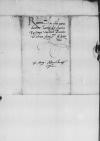Letter #2312
Samuel MACIEJOWSKI to Ioannes DANTISCUSJedlnia, 1540-05-03
| received Marienburg (Malbork), 1540-05-10 Manuscript sources:
| ||||
Text & apparatus & commentary Plain text Text & commentary Text & apparatus
Reverendissimo in Christo Patri, domino
Reverendissime in Christo Pater, domine et amice carissime et honorande.
Habet istic causam quandam generosus dominus
Opto Reverendissimam Dominationem Vestram bene valere, cui me commendo.
Ex
Eiusdem Dominationis Vestrae Reverendissimae servitor


 BCz, 1597, p. 1036
BCz, 1597, p. 1036